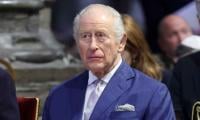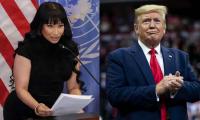Baghdad: A soldier exposes his shoulder and awaits a jab to the amusement of fellow troops, a familiar scene in Iraq where a Covid spike is prompting more vaccinations despite widespread hesitancy.
At a Baghdad hospital administering the Pfizer/BioNTech jab, chaos reigns as dozens of men and women of all ages stream into an inoculation centre where doctors are unaccustomed to seeing such crowds.
An elderly man shuts his eyes as the needle approaches, a young woman poses for her friends, and patients emerge from a room clutching certificates and looking relieved. "In the last 10 days, the number of (vaccination) patients has risen to 600 or 700 people a day" compared with 200 to 400 previously, says Dr. Abbas Mohammed.
"The increase in the number of infections and deaths is really starting to scare people," he says. This week Iraq reported 12,000 new infections in 24 hours, a milestone previously unreached since the pandemic hit in March last year.
On Wednesday, a new daily high was reached with 13,515 cases. The government is ramping up warnings and incentives for people to get vaccinated as well as to comply better with poorly followed health protocols.
"Up until now, I was afraid (of vaccination), but the worsening of the situation has convinced me," says Ali, a young man now "very excited" about getting his first dose.
The wait can last several hours, says 50-year-old Adnan Abdelhamid, bemoaning the "lack of organisation" and "the people who know someone and go before the others". But the majority of patients are satisfied, like Salima Mehdi, an elderly woman whose head is veiled by a chequered scarf.
"I am so happy to be vaccinated, thank God," she says, her eyes gleaming behind her facemask. Dr. Mohammed says the number of people vaccinated in the country each day has risen from 23,000 to 110,000 as of late. And despite the blazing summer heat, queues are getting longer in front of vaccination centres in the capital, in the eastern province of Wasit and in Iraqi Kurdistan to the north.
The number of people to have received two doses reached 1.5 million this week in Iraq, a country with a 40-million strong population and where distrust of vaccines has been particularly strong. "There is a jump in the rate of vaccination in all provinces," health ministry spokesman Saif al-Badr told AFP.
Fifty-year-old Ali admits he has long been afraid of the side effects of vaccines, an anxiety fuelled by misinformation, including from health professionals. "But more and more doctors on TV are explaining why you should get vaccinated. We also see people around us leaving. So I took the plunge," he says, although the rest of his family have yet to decide.
"They are waiting to see; I am their guinea pig," he says with a loud laugh. A doctor at a private clinic says his patients prefer to get treated for Covid rather than get vaccinated. Meanwhile, more than 4 billion doses of anti-Covid vaccines have been administered around the world, eight months after the vaccination drive started, according to an AFP count Thursday.
Global injections have slowed slightly: this fourth billion was reached in 30 days, while it took only 26 days to reach the previous one. The first and second billion were reached after about 140 and 40 days respectively.
Forty of the four billion shots have been administered in China (1.6 billion). India (451 million) and the United States (343 million) make up the trio of countries that have administered the most jabs.
In terms of population among countries with more than one million people, the United Arab Emirates is the leader: 168 first and second doses administered per 100 inhabitants. Uruguay follows (137), then Bahrain (134). The UAE is close to having 70 percent of its population fully vaccinated while Uruguay and Bahrain have both reached more than 60 percent.
After this the leading countries are Qatar, Chile and Canada (129 shots per 100 inhabitants), Israel (128), Singapore (125), the United Kingdom, Mongolia and Denmark (124) and Belgium (121).
These countries have all fully vaccinated more than half their populations. Not far off this are China (111), the United States (104) and the European Union (103). The US and EU have fully vaccinated nearly half their population while China does not communicate this information.
Most poor countries have now started to vaccinate, mainly thanks to the Covax scheme and donations of unused doses by rich countries, but the vaccination coverage remains very unequal: high-income countries (as defined by the World Bank) administered an average of 97 doses per 100 inhabitants compared with just 1.6 doses in low-income countries.
On average 52 shots have been injected per 100 inhabitants worldwide. Four countries are not yet vaccinating: Burundi, Eritrea, Haiti and North Korea. In a related development, France said on Thursday it failed to understand why it was exempt from a new rule allowing fully-vaccinated European Union citizens to enter England without having to quarantine.
From next week, travellers fully jabbed with a vaccine approved by the US Food and Drug Administration or the European Medicines Agency will be able to travel from any country on the British government’s "amber" traffic light list without having to self-isolate at home for 10 days, the UK government said on Wednesday. Arrivals from France are the only exception.
"This decision is discriminatory towards French people," said French European Affairs Minister Clement Beaune. "It is excessive and makes no sense in terms of health policy," he told the LCI TV channel, adding that "it has no foundation in science".
The UK singled out France due to the government’s concern over the "persistent presence" of the Beta variant, which is believed to be more resistant to vaccines. But Beaune said the Delta strain accounted for fewer than five percent of Covid cases in France, and mostly occurred in overseas territories from where relatively few people travelled to the UK.
Beaune also said he regretted that travellers from the EU could still not enter the US, even though American tourists can easily come to EU countries so long as they are vaccinated or have a negative Covid test.
"We should have kept reciprocity as a trump card up our sleeves at the European level," he said. "Perhaps Europe overall should have been tougher in the negotiations." Meantime, China on Thursday reported small coronavirus outbreaks driven by the Delta variant in three provinces as a cluster linked to an eastern airport spreads despite mass testing and a vaccination drive.
The flare-up, which began after nine workers at the Nanjing airport tested positive on July 20, has seen 171 cases detected in Jiangsu province, while infections have spread to at least four other provinces.















